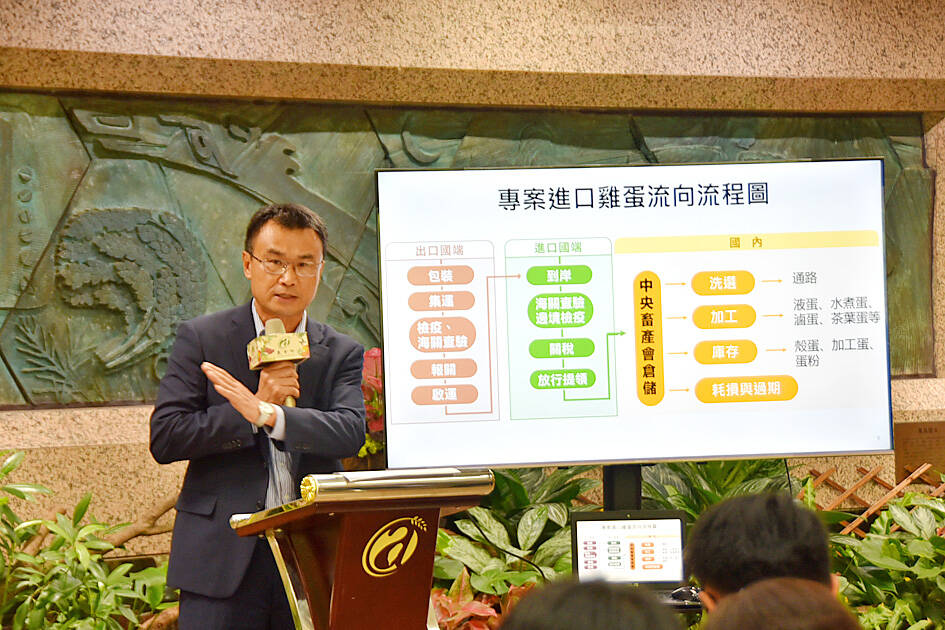More than 54 million imported eggs will be disposed, as their expiration date has passed, Minister of Agriculture Chen Chi-chung (陳吉仲) said yesterday.
Chen made the remarks at a news conference in Taipei, explaining the flow of imported eggs following recent controversies regarding the products.
The ministry introduced a special egg import program to address a nationwide egg shortage earlier this year.

Photo courtesy of Changhua County Government
However, controversies have risen in recent weeks. These included an accusation that the government helped some egg importing companies over others, eggs imported from Brazil that had an incorrect expiration date, and egg shipments from Brazil that were found to contain florfenicol and chloramphenicol residues.
Chen said that about 145.31 million eggs were imported from March to July, which included 17.14 percent washed eggs, 23.59 percent processed eggs, 4.3 percent reserved shell eggs, 17.78 percent reserved processed eggs and 37.18 percent damaged or expired eggs.
Importing eggs had helped to suppress black market prices, but the domestic egg farmers’ livelihoods must also be attended to, Chen said, adding that more than 50 million damaged or expired eggs did not enter the domestic market, and would be composted instead.

Photo: Wu Po-hsuan, Taipei Times
“It achieved the goal of domestic food security, and the cost was worth it,” he said, adding that the egg import program allowed people to pay NT$2 (US$0.06) less for each egg.
Chen said the global avian flu outbreak last year contributed to egg supply shortage and high prices in Japan, the US and many other countries
Domestic egg farmers also reduced the number of hens they raised due to increasing costs of feed, he said.
The black market price reached as high as NT$1,800 for a crate of eggs at one time, so the government launched the program for importing eggs from 12 countries from March to June, he said.
Chen said eggs were imported from seven countries — Australia, Brazil, Malaysia, Thailand, the Philippines, the US and Turkey — from March to July.
However, if all the imported eggs were released to the domestic market, it would negatively impact the livelihoods of the domestic egg farmers. The ministry therefore adopted a rolling-review method for releasing the eggs, which resulted in about 54.02 million eggs damaged or expired, with the cost of each egg being about NT$5, and the total loss about NT$200 million, he said.
Chen said that the import program allowed people to pay NT$2 less for each egg, suppressing inflation and black market prices, so even with the financial loss, a beneficial result has been achieved.
Meanwhile, Vice Premier Cheng Wen-tsan (鄭文燦) on Friday responded to the Taichung City Government, which said the ministry was unwilling to reveal the flow of eggs imported from Brazil.
It was a misunderstanding and that the data can be obtained, Cheng said.
However, the Chinese Nationalist Party (KMT) caucus revealed documents yesterday showing it has asked for the flow of eggs imported from Brazil, but did not receive a response from the ministry.
KMT caucus whip William Tseng (曾銘宗) said the caucus had submitted documents to the ministry on Aug 30 and Sept. 5 asking for data about its egg import program, including the basis for commissioning importers and their eligibility, the number of eggs distributed to each retailer, the flow of imported eggs in the domestic market and in reserve, among other data. The ministry did not respond.
New Power Party caucus whip Chiu Hsien-chih (邱顯智) wrote on Facebook that his caucus filed a document on Monday to the ministry, asking for information and the contracts associated with the egg import program, but it still did not provide the complete information.
Additional reporting by CNA

An essay competition jointly organized by a local writing society and a publisher affiliated with the Chinese Communist Party (CCP) might have contravened the Act Governing Relations Between the People of the Taiwan Area and the Mainland Area (臺灣地區與大陸地區人民關係條例), the Mainland Affairs Council (MAC) said on Thursday. “In this case, the partner organization is clearly an agency under the CCP’s Fujian Provincial Committee,” MAC Deputy Minister and spokesperson Liang Wen-chieh (梁文傑) said at a news briefing in Taipei. “It also involves bringing Taiwanese students to China with all-expenses-paid arrangements to attend award ceremonies and camps,” Liang said. Those two “characteristics” are typically sufficient

A magnitude 5.9 earthquake that struck about 33km off the coast of Hualien City was the "main shock" in a series of quakes in the area, with aftershocks expected over the next three days, the Central Weather Administration (CWA) said yesterday. Prior to the magnitude 5.9 quake shaking most of Taiwan at 6:53pm yesterday, six other earthquakes stronger than a magnitude of 4, starting with a magnitude 5.5 quake at 6:09pm, occurred in the area. CWA Seismological Center Director Wu Chien-fu (吳健富) confirmed that the quakes were all part of the same series and that the magnitude 5.5 temblor was

The brilliant blue waters, thick foliage and bucolic atmosphere on this seemingly idyllic archipelago deep in the Pacific Ocean belie the key role it now plays in a titanic geopolitical struggle. Palau is again on the front line as China, and the US and its allies prepare their forces in an intensifying contest for control over the Asia-Pacific region. The democratic nation of just 17,000 people hosts US-controlled airstrips and soon-to-be-completed radar installations that the US military describes as “critical” to monitoring vast swathes of water and airspace. It is also a key piece of the second island chain, a string of

The Central Weather Administration has issued a heat alert for southeastern Taiwan, warning of temperatures as high as 36°C today, while alerting some coastal areas of strong winds later in the day. Kaohsiung’s Neimen District (內門) and Pingtung County’s Neipu Township (內埔) are under an orange heat alert, which warns of temperatures as high as 36°C for three consecutive days, the CWA said, citing southwest winds. The heat would also extend to Tainan’s Nansi (楠西) and Yujing (玉井) districts, as well as Pingtung’s Gaoshu (高樹), Yanpu (鹽埔) and Majia (瑪家) townships, it said, forecasting highs of up to 36°C in those areas